|
|
|
Sort Order |
|
|
|
Items / Page
|
|
|
|
|
|
|
| Srl | Item |
| 1 |
ID:
121573
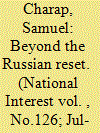

|
|
|
|
|
| Publication |
2013.
|
| Summary/Abstract |
WITH THE recent downturn in U.S.-Russian relations, observers in both Washington and Moscow have remarked upon the cyclical nature of this key bilateral relationship. As Fyodor Lukyanov, a leading Russian commentator, noted in late 2012, "If we look at the relationship since 1991, it's the same cycle all the time, between kind words and inspiration and deep crisis. Yeltsin, Clinton, Bush, Putin, Obama, it's the same pattern." Indeed, the phases of high hopes and expectations in the years 1991-1994, 2000-2003 and 2009-2011-followed by deep disappointment in the intervening and subsequent years-do seem to represent a cyclical pattern.
|
|
|
|
|
|
|
|
|
|
|
|
|
|
|
|
| 2 |
ID:
149556
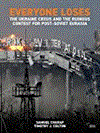

|
|
|
|
|
| Publication |
Oxon, Routledge, 2017.
|
| Description |
212p.pbk
|
| Series |
Adelphi Series no.; 460
|
| Standard Number |
9781138633087
|
|
|
|
|
|
|
|
|
|
|
|
Copies: C:1/I:0,R:0,Q:0
Circulation
| Accession# | Call# | Current Location | Status | Policy | Location |
| 058917 | 327.470477/CHA 058917 | Main | On Shelf | General | |
|
|
|
|
| 3 |
ID:
146352
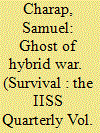

|
|
|
|
|
| Summary/Abstract |
Following Moscow’s invasion of Crimea and support for the insurgency in eastern Ukraine, the concept of ‘hybrid war’ has emerged as a catch-all description for the new Russian threat to European security. The concept itself – a blending of conventional and non-traditional tactics to achieve political–military objectives – is not novel. But its prominence in Western analysis of Russia’s actions over the past two years surpasses all previous usage. In this same period, Russian military strategists have also written extensively on hybrid warfare. The assumptions underlying both perspectives are equally misguided.
|
|
|
|
|
|
|
|
|
|
|
|
|
|
|
|
| 4 |
ID:
135222
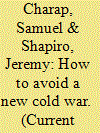

|
|
|
|
|
| Summary/Abstract |
This year, the tragedies and outrages of the Ukraine crisis have dominated headlines and thinking about Western relations with Russia. There can be little doubt that the United States and its European allies and partners need a response to the Russian annexation of Crimea, to the destabilization of eastern Ukraine, to the separatists’ downing of a civilian airliner—and to the threat to global order that all of these actions
represent.
|
|
|
|
|
|
|
|
|
|
|
|
|
|
|
|
| 5 |
ID:
138796
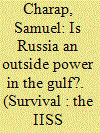

|
|
|
|
|
| Summary/Abstract |
When Russia is invoked in analysis of outside powers’ role in the Middle East, it is often thought of in two related ways: either as a shrunken Soviet Union or as a potential regional security guarantor should the United States abdicate that role. Following the 2013 IISS Manama Dialogue, a Gulf leader was quoted as saying: ‘the Russians have proved they are reliable friends … As a result, some states in the region have already started to look at developing
more multilateral relations, rather than just relying on Washington.
|
|
|
|
|
|
|
|
|
|
|
|
|
|
|
|
| 6 |
ID:
091406


|
|
|
|
|
| Publication |
2009.
|
| Summary/Abstract |
The unique form of capitalism that developed following the Yukos affair seems likely to survive the current economic upheaval.
|
|
|
|
|
|
|
|
|
|
|
|
|
|
|
|
| 7 |
ID:
140151
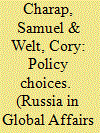

|
|
|
| 8 |
ID:
150981
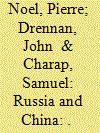

|
|
|
|
|
| Summary/Abstract |
By accommodating each other’s strategic interests, Russia and China have achieved an effective partnership despite significant imbalances between them.
|
|
|
|
|
|
|
|
|
|
|
|
|
|
|
|
| 9 |
ID:
128840
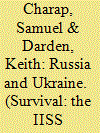

|
|
|
|
|
| Publication |
2014.
|
| Summary/Abstract |
The West has often assumed that Russia is inherently hostile to Ukraine, and the Marchevents seem to validate that assumption. But Moscow's moves are in fact a realdeparture from previous Russian policy.
In his book The Clash of Civilizations and the Remaking of World Order, Samuel Huntington makes the case for the utility of an external enemy in maintaining a coherent US national identity. 'For self-definition and motivation, people need enemies', he wrote.1 His thesis has been widely discredited. But recent developments in Ukraine seem to have partially validated the claim, and given it a new dimension. After 25 years of the West treating Russia as an enemy in Ukraine, Moscow might have really become one. Even prior to recent events, the depiction of Russian policy in Ukraine as nefarious has always, of course, held a kernel of truth. Russia's actions there since the Soviet collapse have been far from constructive and transparent. And the rhetoric of senior officials - in a particular notorious example, Vladimir Putin himself questioned whether Ukraine was a real country in a private moment with George W. Bush - has at times been inflammatory, subversive or incendiary.
But until the collapse of the EU-brokered political settlement on 21 February, Russia's actions in Ukraine had never merited the labels usually ascribed to them: expansionist, neo-imperial, neo-Soviet, aggressive, and so on. Indeed, until that watershed moment, it would have been wrong to attribute any significant development in Ukraine's recent political crisis to Russia. Yes, in the autumn of 2013 Russia did use economic levers to demonstrate to President Victor Yanukovich the costs of proceeding with the proposed Association Agreement with the EU. But it was Yanukovich, at the end of the day, and not Putin, who decided to make the shift - and it is unlikely that the Ukrainian president was serious about implementing the agreement in the first place. Even so, Russia's levers in Ukraine are entirely of the Ukrainians' making. If Yanukovich or any of his predecessors had spent less time getting rich off the gas trade with Russia, and more time implementing a comprehensive energy-efficiency policy (Ukraine has one of the world's highest rates of energy consumption per unit of GDP), creating a domestic gas market and forging an investment climate conducive to the development of Ukraine's own gas reserves, Moscow would not have had any significant economic leverage. The effectiveness of economic coercion in this case is no credit to Russia's strength; rather, it is a reflection of the utter failure of the Ukrainian elite to reform the country's economy.
|
|
|
|
|
|
|
|
|
|
|
|
|
|
|
|
| 10 |
ID:
116652
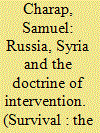

|
|
|
|
|
| Publication |
2013.
|
| Summary/Abstract |
Since the beginning of the Syrian crisis, there have been intermittent hopes that Moscow might play a constructive diplomatic role in resolving it. But the focus on Russia has been deeply misleading. Russia, for reasons that have little to do with Syria itself, was never going to be part of the solution to the crisis - at least on terms that the West and the Syrian opposition could accept. Further, Russia's centrality to international diplomacy on this issue and its seeming obstinacy expose deep flaws in post-Cold War Western doctrine on international intervention. Russia's centrality when it comes to Syria is more a function of those flaws than anything else.
|
|
|
|
|
|
|
|
|
|
|
|
|
|
|
|
| 11 |
ID:
077573
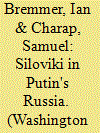

|
|
|
|
|
| Publication |
2007.
|
| Summary/Abstract |
Little is known about the siloviki, commonly but misleadingly described as a group of current and former intelligence officers from Putin's hometown of St. Petersburg. Yet, its members, interests, relationships, and influence are helping shape Russia as its 2008 presidential elections approach
|
|
|
|
|
|
|
|
|
|
|
|
|
|
|
|
| 12 |
ID:
130861
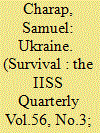

|
|
|
|
|
| Publication |
2014.
|
| Summary/Abstract |
The ugly truth is that Moscow can still undermine any Western plan for Ukraine's future. The crisis is likely to lead to a period of sustained disequilibrium and instability. As Ukraine's winter of domestic discord transformed into a spring of territorial partition and instability, European and American officials seemed to be speaking from an agreed set of talking points in their public remarks on the crisis. While hopeful transatlanticists sought to construe this remarkable consistency as a demonstration of a new seriousness of purpose in the West, the litany of warnings, threats and prescriptions for resolution (inevitably characterised as either an 'off-ramp' or 'de-escalation') spoke more to the desperation of those uttering them to quickly find a new, stable equilibrium for Ukraine, Russia and the international system. Yet the talking points and buzzwords, no matter how many times they are repeated, do not in fact describe either a sustainable equilibrium or an end point to the crisis. Instead, the disequilibrium and instability of the Ukrainian crisis seem likely to endure for some time: the search for a 'new normal' promises to be long, costly and highly disruptive of both individuals' lives and the international order.
|
|
|
|
|
|
|
|
|
|
|
|
|
|
|
|
|
|
|
|
|